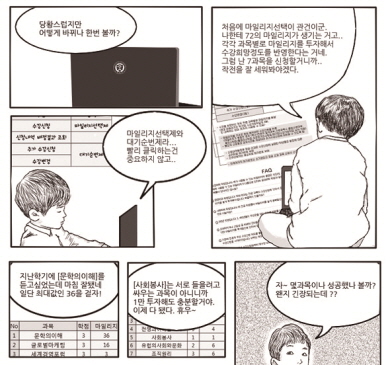
Yonsei’s previous registration system, which is still widely used by many universities, has caused serious competition among students for years. As the process is a first-come-first-served basis, students’ study plans and schedules are often decided in a few minutes by quick clicking. Students who fail to register for the necessary courses often engage in “course trade” in which students buy and sell places in popular courses. Some even make use of a computer program that stimulates continuous automatic clicks.
To tackle such problems, Yonsei University introduced a “mileage selection system” for this semester, which made its first run on Aug. 10. In the new system, students are assigned mileage points according to their number of credits, and then use them to secure courses they plan to take. Students can use up to half of their points to most courses except for a few popular courses that limit the amount of points students can offer. The more points they allocate to a particular course, the more likely they are to register in the course.
“The purpose of mileage selection is to make a systematic structure in which students’ study plans and levels of preference are considered more than just clicking speed,” said Park Byung-il, the head of Yonsei’s Academic Assistance Department.
Park explains that after introducing the new system, the amount of clicking decreased by 90 percent and the success rate increased radically as well.
However, complaints have arisen about the standards of assigning priority for those who had allocated the same number of mileage points. Originally, the standards had not only included the grade but also the GPA and birth date, which were eliminated due to students’ complaints. Some students also criticize the unfairness of the system. For example, the system is favorable to students of majors in which competition for major courses is not high since they can allocate extra mileage points they saved up from major classes to other courses.
According to a Yonsei Student Association’s survey answered by 1,562 Yonsei students who participated in the first simulation conducted in June, 85 percent of respondents answered that the new system is not yet sufficient enough to replace the previous system.
“It is unfair for students in lower grades who have more classes to take than those in higher grades,” said Lee Na-Eun, a senior Yonsei student.
Park responded that it is natural to favor students in higher grades since they are facing graduation.
“After all, students in lower grades will benefit from the system as time passes,” Park said. “The school is conceiving countermeasures to make the system more complete to replace the previous system.”
Other universities have also made efforts to lessen the intensity of the “registration war.” For instance, Sogang University has brought in a “shopping cart system” for the fall semester so that students can check the competition rate and come up with second plans during the registration period. Ewha Womans University has newly allowed students to log in 30 minutes before the actual registration to prevent situations in which students fail to log in due to the massive simultaneous log-ins. Sookmyung University, which used to give priority to students based on their previous GPA, recently showed the expected cut-off point for each course during the registration period. According to Sookmyung, the failure ratio remains less than 8 percent.
However, many students expressed that such changes are still insufficient to resolve chronic problems of previous registration system.
“I hope instead of bringing in minor and confusing changes, universities would increase the number of courses which is the fundamental solution for this chronicle issue,” said Kim Eun-su, a senior at Hanyang University.
Kim Hye-won
kimhyewon@ewhain.net

